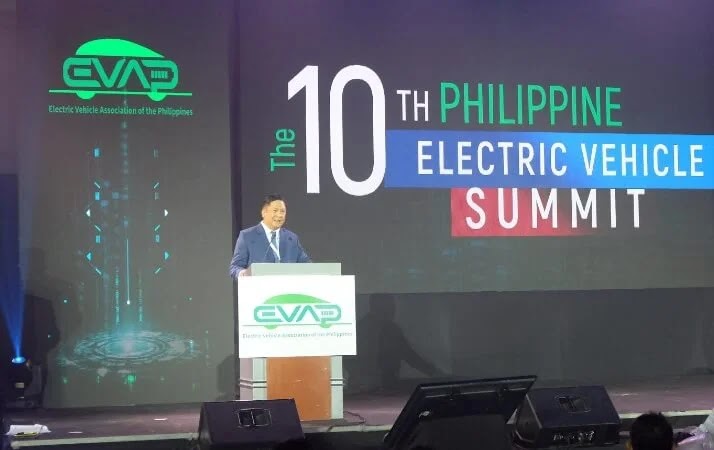ASEAN Center for Energy and Asian Federation of EV Associations Policy Dialogue
The ASEAN Center for Energy (ACE) and the Asian Federation of EV Associations (AFEVA) organized a policy conversation at the 10th Philippine EV Summit on October 21, 2022, at the SMX Convention Center Mall of Asia in Pasay City. The UN Environment Programme (UNEP) supported the policy conversation as part of its new worldwide effort to encourage the transition to electric mobility in low and middle-income nations around the world.
 |
| ASEAN Center for Energy and Asian Federation of EV Associations Policy Dialogue |
The policy debate aims to expedite the development of the ASEAN EV market and industry by addressing challenges affecting both individual member states and the region as a whole. The absence of rules on electric two/three wheelers and retrofitting / conversion of ICE vehicles to electric were two main topics raised in the region.
Mr. Edmund Araga made the opening comments. He emphasized the critical role that two and three-wheelers play in ASEAN e-mobility. They have the greatest potential for EV adoption as well as the opportunity to grow the region's EV industry.
Ms. June Yeonju Jeong, Program Officer, Sustainable Mobility Unit, United Nations Environment Programme, highlighted UNEP's Global Electric Mobility Programme, which assists more than 50 low- and middle-income nations in transitioning from fossil fuel to electric vehicles. In the Philippines, an electric two- and three-wheeler freight delivery demonstration project was established, with Pasig City LGU and the Philippine Postal Office as project receivers.
Mr. Septia Buntara Supendi, ASEAN Center Energy (ACE) Manager for Sustainable Energy, Renewable Energy, Energy Efficiency and Conservation, presented the ASEAN Plan of Action for Energy Cooperation (APAEC) Phase II: 2021-2025, Programme Area No 4: Energy Efficiency & Conservation.
This program aims to lower energy intensity by 32% by 2025 and support EE&C efforts, particularly in transportation and industries. This program encourages EV adoption in the region. ACE sees potential collaboration with AEFVA in five key areas for EV integration: cooperation on the promotion of harmonized EV standards and technologies; networking within the region/member associations to promote joint ventures/collaboration of business entities; sharing of best practices and information about the industry; extending support and active participation in member associations' initiatives and projects; facilitating student exchanges and university cooperation; and facilitating student exchanges and university cooperation.
Two sessions were scheduled to address the two key topics. Mr. Septia Buntara Supendi, Manager for Sustainable Energy, Renewable Energy, Energy Efficiency and Conservation ASEAN Center for Energy; Dr. Yossapong Laoonual, Honorary Chairman Electric Vehicle Association of Thailand; Mr. Krisda Utamote, President of Electric Vehicle Association of Thailand; Dato Dennis Chuah, President of Electric Vehicle Association of Malaysia; and Mr. Edmund Araga, President of Asian Federation EV Associations participated in the panel discussions (AFEVA).
The first session focused on the market and policy scenario for electric two and three-wheelers in ASEAN. Dr. Manny Biona, Executive Director of the Electric Vehicle Association of the Philippines, provided an overview of the state of play in the ASEAN region for electric two and three-wheelers. The panel reviewed the necessity to develop a strategy on technical laws and standards with the individual ASEAN member countries, as well as their regional harmonization.
The second session will focus on converting ICE vehicles to electric. Mr. Krisda Utamote, President of the Electric Vehicle Association of Thailand, presented Thailand's conversion challenges and opportunities. Thailand's national target of 30% ZEV usage, or around 225,000 units per year, by 2025 is ambitious. Despite market demand, certain BEV models, particularly for pickup trucks, are not yet available.
Thailand has 40 million registered automobiles. The million pick-up trucks and the 3.5 million vehicles older than ten years are the target vehicle models for EV conversion. Thailand's government intends to produce electric vehicles (EVs) by retrofitting used cars through the state-run Electricity Generating Authority of Thailand (Egat). Thai officials are also in the process of permitting electric car conversions to be registered. The Electric Vehicle Association of the Philippines (EVAP) is also calling for an EV conversion policy to speed up the adoption of electromobility in the country.
Mr. Martin Knoss, Robert Bosch Automotive's Power Train Solutions Regional President for ASEAN, discussed the company's EV technologies and how it is collaborating with companies in the region.
